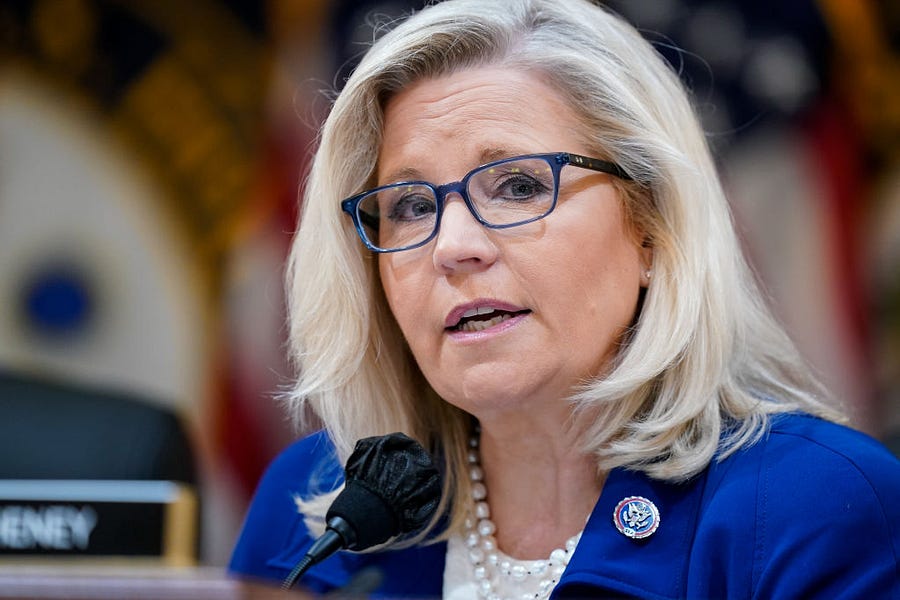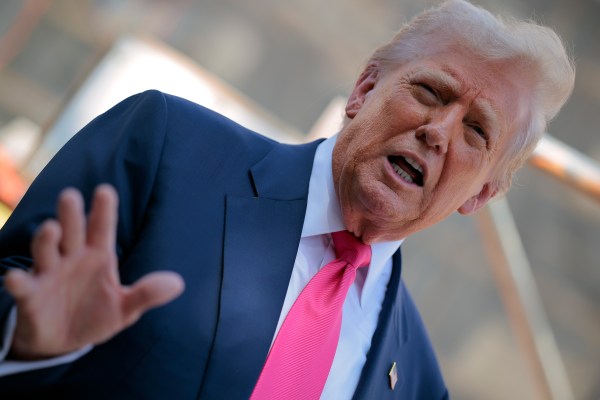Prominent Republican elections blog Red Racing Horses (RRH) recently scolded Rep. Liz Cheney, who faces primary voters next week, saying, “Sticking to your guns and voting your conscience is one thing. Torpedoing your career by trying to change the minds of the vast majority of your party’s primary voters almost single-handedly, (by joining the January 6th Commission) is another.” Citing polls showing Cheney losing handily to her former supporter-turned-election conspiracy theorist, Harriet Hageman, the post continues, “I’m not sure that Dick (Cheney) ever taught Liz about the aphorism ‘live to fight another day.” This insightful comment perfectly encapsulates the best-case argument against Cheney.
It’s also dead wrong.
The recommendation “live to fight another day,” raises the question: Fight … for what? She could serve in Congress for decades longer and never do as much to preserve our constitutional order as she has serving as the key Republican on the January 6 committee.
A decade ago, as a junior congressional staffer, I had a front-row seat to representatives learning this lesson. After the Tea Party wave of 2010 brought in nearly 100 freshman members of Congress, there was excitement, but also frustration. I was privy to a conversation involving two members of Congress lamenting that they had so little influence. “I came to Congress to do something, and it’s like I have no say,” said one. “You are irrelevant to this process,” said the other, resigned.
These representatives learned that, particularly in a democracy, no one person usually has much power over the waves of politics. Being merely one of 435 members of the House gives one very little ability to influence the direction of the political draft. The ability of any individual to make a significant, meaningful difference is both difficult and rare, even for those who hold federal office.
Cheney’s decision to join the January 6 committee was to use her office to do something. Namely, holding former President Donald Trump accountable for his illegal and dangerous attempts to stay in office through bullying, threats, and lies that ultimately led to the violence of January 6. This is something no other Republican, save fellow committee member Rep. Adam Kinzinger of Illinois, was willing to do. As New York Times columnist Katherine Miller recently said, Cheney has internalized the saying, “If you don’t do it yourself, nobody is coming to help you.”
Cheney knew that this decision would be unpopular. She’d already been ousted from her perch as the House Republican Conference chair because of her outspokenness against Trump’s post-election malfeasance. Moreover, it doesn’t take a genius to figure out that telling nearly 70 percent of your state’s voters (and an even higher percentage of Republicans) that they had voted for a potentially criminal reprobate, was always going to be a hard sell. If polls are to be believed, they aren’t buying.
If Cheney had chosen to be quieter, as RRH suggested, there’s a decent chance she could have kept her seat and “lived to fight another day.” It’s worth mentioning that the people who run RRH are not election deniers. They openly call Trump’s fact-free claim that he won the 2020 election a “big lie,” and they are not shy about continuing to call out Trump and his media backers for falsehoods. Their case is not against Cheney on substance, but on politics. And they are undoubtedly right that she would have had a much better chance of keeping her seat in Congress by muting her opposition to Trump.
The question that isn’t being addressed, however, is what would Cheney do with those extra years? She’d undoubtedly pass a few bills, influence others. Maybe work her way up to be a committee chair. But anything she would do differently from any other member of Congress from Wyoming would be minimal.
There is truth to the idea that sometimes you need to make compromises to accomplish anything. The first job of a politician is to be elected, or they’ll be hard pressed to accomplish much. But at a certain point, you need to take opportunities to make a difference, even ones that may wound or end your political career, or else be rendered irrelevant. Cheney addressed this specifically, saying “If the cost of standing up for the Constitution is losing the House seat, then that’s a price I’m willing to pay.”
Hageman is a counter example. She previously called Donald Trump “racist and xenophobic,” and the 2016 Republican National Convention even tried to stop him from getting the nomination after he’d already essentially clinched it. But now, she’s a big Trump supporter and claims she was fooled by “Democrats, and Liz Cheney’s media friends.”
It would be difficult to find a more humiliating and debilitating way to enter Congress than by saying, “Vote for me because I’m easily conned by members of Congress and the media,” but that’s essentially what Hageman is doing. She’s decided she’d like to occupy the seat, and will do anything to get it. That mindset will leave her with little to no control over her fate. She could be replaced by a proxy vote, and it wouldn’t matter.
Cheney, on the other hand, is making a real difference. The history of the January 6 committee, whereby Minority Leader Kevin McCarthy opposed a more rigorous and less partisan version of the committee as bargained for by his own hand-picked negotiator, Rep. John Katko, is complicated and depressing. Yet the existence of this less-than-ideal committee, to gain access to and document facts about Trump’s post-election attempts to undermine the electoral process, is important for both the near and distant future. Without Cheney, this committee would have less credibility (which is what drives the rage against her), and would drift into a more partisan, and less useful, direction.
Indeed, as National Review’s Andy McCarthy sagely observed, Cheney is “winning” the committee because her goal is to make a “powerful showing that Trump is unfit” and “to show the public, Republicans in particular … that even if (Trump) seeks the nomination,” that “no party in its right mind would make him its standard-bearer.”
This is different from the Democrats on the committee, who, even assuming the best about their motives, are still acting predictably in their best political interests, which is mostly to cast blame at their opponents and distract from their own failures. There is nothing inherently wrong with honest partisanship, but unalloyed from a true purpose, it becomes dishonest and unmoored. Indeed, some Democrats are cynically boosting Republican candidates who pledge loyalty to Trump’s lies in the belief they will be easier to beat while simultaneously claiming such candidates are a threat to democracy itself.
Indeed, in large part because of Cheney’s presence, the committee has largely (although not entirely) stayed away from the purely partisan distraction that this exercise could have been and focused on substantive facts that members of both parties need. Most of the witnesses are Republicans who worked with or for Trump, and it undoubtedly made it easier to testify about their concerns knowing that Cheney shared their concerns from her perch on the committee.
Cheney’s efforts matter. A recent poll finds that “a majority of registered voters (53%) now say—in the wake of the House select committee’s high-profile Jan. 6 hearings—that Trump should not even be allowed to serve as president again, due to his efforts to overturn the 2020 election.” The poll also shows that Republican voters are increasingly looking for new alternatives.
It’s rare, but others have chosen the same difficult path. The late Sen. John McCain and former Sen. Joe Lieberman made a similar choice. From 2007-2008, there was a raging debate over the “surge” in Iraq, which was highly unpopular. Democrats were trying to defund the surge, and many Republicans privately wanted to, afraid of the political consequences. But proponents of the surge carried the day, because McCain, a Republican presidential candidate, and Lieberman, a heterodox Democrat, took huge political risks to publicly defend it. Their efforts to do so saved America from defeat, and Iraq from disaster. But Lieberman didn’t bother running for Senate again, having alienated much of his base. McCain was luckier. The surge proved successful, and it likely ended up helping him in the 2008 presidential primaries (how it affected the general is hard to tell), but it didn’t look like that would be the case till the last minute.
Mike Pence is another who chose the road less traveled. As I’ve argued in the past, Pence’s refusal to illegally reject Biden electors on January 6, 2021, was an act of heroism. In a sense, no sitting vice president has ever had as much of an impact on the future of America than Pence did. He single-handedly halted a major constitutional crisis. Hopefully, the country will never face one again in his lifetime.
To paraphrase Captain Queenan from the Academy Award winning film The Departed, Cheney chose to be a member of Congress, to do the substance of what a legislative check on a dangerous executive looks like, rather than to simply go through the motions and appear to be a member of Congress, but having no real influence. Much as Pence’s deeds narrowly averted a constitutional crisis, Cheney is using her position to ensure we don’t face another one.
Even if it ultimately costs Cheney her seat, she’ll have made a much larger impact with her six years in Congress than most anyone else would have in 26.






Please note that we at The Dispatch hold ourselves, our work, and our commenters to a higher standard than other places on the internet. We welcome comments that foster genuine debate or discussion—including comments critical of us or our work—but responses that include ad hominem attacks on fellow Dispatch members or are intended to stoke fear and anger may be moderated.
With your membership, you only have the ability to comment on The Morning Dispatch articles. Consider upgrading to join the conversation everywhere.